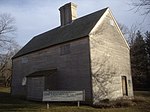Peconic Bay
Bays of New York (state)Bays of Suffolk County, New YorkRiverhead (town), New YorkShelter Island (town), New YorkSouthampton (town), New York ... and 1 more
Southold, New York

The Peconic Bay is the parent name for two bays (Great Peconic Bay and Little Peconic Bay) between the North Fork and South Fork of Long Island in Suffolk County, New York, United States. It is separated from Gardiners Bay by Shelter Island.
Excerpt from the Wikipedia article Peconic Bay (License: CC BY-SA 3.0, Authors, Images).Peconic Bay
Geographical coordinates (GPS) Address Nearby Places Show on map
Geographical coordinates (GPS)
| Latitude | Longitude |
|---|---|
| N 40.963611111111 ° | E -72.466666666667 ° |
Address
Robins Island
11956
New York, United States
Open on Google Maps









